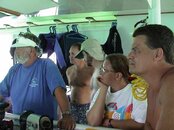That's what I've been trying to tell you to do ...
I am

I guess that doesn't come across via the forum sometimes.

I get where you're coming from, but you've been laying blame pretty thick on the OP, and I don't think that's warranted.
Well, that is a personal opinion. Bear in mind that the author of the report (
who isn't the thread OP, that shared the report) posted/copied their 'assassination' onto nearly 40 different forums and pages across the web....
So, yes... in this instance...and this instance particularly... I do want to redress the balance a little. I don't know the author...and I don't know the dive operator... but I do know there are two sides to every story. I also know that there
are lots of recreational divers out there who are completely irresponsible in their approach to diving.... and that many of the criticism that those people make are as much (or more) their fault, as they are a dive centres.
I disagree that you should be judging a recreational-level vacation diver by the standards of a tech instructor, which is what I read in your comments.
I have been trying to stress that my comments aren't reflective of any qualification I hold. I've always done my research before diving. That probably stems more from my natural mindset and the particular branch of service I worked with in the military.
Before I go
anywhere (diving or not), I spend some time online, in the library, in bookshops... making sure I know as much about the place/activity/culture etc as I can. I do that for safety and enjoyment...and to make sure I get the most out of a trip. It's not specific for diving, nor reflective of any qualification I hold. I attempted to translate that approach into diving context for the benefit of this thread, because it is potentially good advice to anyone who reads this.
As mentioned earlier... Google has a lot of good information. This thread is part of that now... it's on page 1 if you Google Komodo diving/dangers/hazards etc. I wasn't trying to win a debate/argument... I was trying to put some beneficial advice into the public domain.
 ... so ... 60 seconds on Google should tell me everything I need to know about every dive site in Komodo.
... so ... 60 seconds on Google should tell me everything I need to know about every dive site in Komodo.





